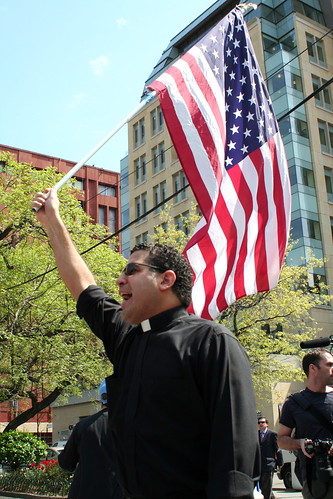 |
| Photo Credit: Boss Tweed |
Matthew Soerens recently offered a guest post on Christena's blog entitled Crossing Borders in the Church: On Embracing Undocumented Immigrants that I think is worth a read.
A highlight:
"Several months ago, I was invited to speak at a large, conservative Southern Baptist church that is, in some ways, a microcosm of American evangelicalism as a whole. The crowd of several thousand at the first Sunday service was distinctly older and almost entirely white, but at the morning’s second service, the senior pastor removed his tie and delivered exactly the same sermon to an audience that was much more ethnically diverse. Later that day, under the same roof, the church hosted worship services and Bible studies in Creole, Russian, Spanish, and Portuguese. Within that one local church—as is true of the Church as a whole in the United States—coexist native-born U.S. citizens, naturalized citizens, lawfully-present immigrants, and undocumented immigrants, and with them a broad range of views on immigration policy.
One of the church’s pastors related to me that, the previous week, a young Hispanic man had come forward at the end of the service seeking prayer. He shared, hesitantly, that he was facing deportation. He’d talked to lawyers and tried everything he could to resolve his situation, but it seemed inevitable that he would be separated from his family. The pastor prayed for God’s provision and, then, as the man turned to leave, added, “We just want you to know how welcome you are at our church.”
“With all due respect,” the man replied, “if people at this church knew I was ‘illegal,’ they would hate me.”
The pastor assured him that their church—which, to their credit, had done far more than the average congregation to embrace immigrant communities—loved him. But he went home, he told me, shaken by the man’s comment: what was it about his church that had conveyed to this man that people would despise him if they knew he lacked legal status?
However, if we consider the rhetoric that some in our society, including some Christians, have used to discuss the topic of illegal immigration, the young immigrant’s conclusion that many of his native-born Christian brothers and sisters might hate him seems quite logical. When presidential primary candidates compete to see who can be harsher on undocumented immigrants and the TV pundits say they’re doing so to win the “evangelical vote” in the Iowa Caucus, the undocumented within our churches notice. When the church’s parking lot is marked with bumper stickers for a candidate who proposes—to wild applause—the construction of an electrified fence that would kill those who attempt to unlawfully enter the United States, the unintentional message is: “I’d rather you’d be dead than sitting next to me at church.”
Whenever those associated with Christianity blame the undocumented for the country’s economic trouble (despite nearly unanimous economic data to the contrary), imply that most are criminals or terrorists, or compare them to rats, cockroaches, or any other animal, the message conveyed to the undocumented within our congregations—even if very few would convey such a message directly—is that “God loves you…but we loathe you.”Some sobering thoughts to consider.
To read the rest of Matthew's post please click here.
